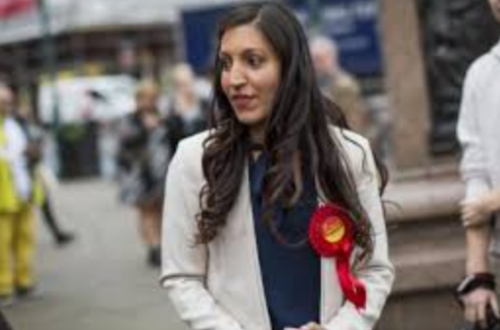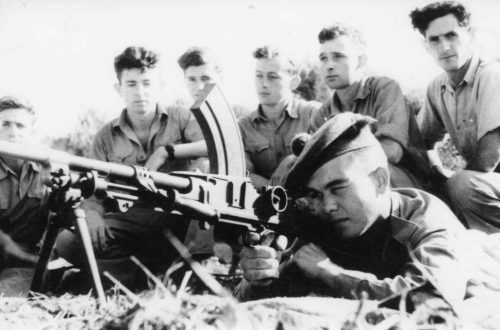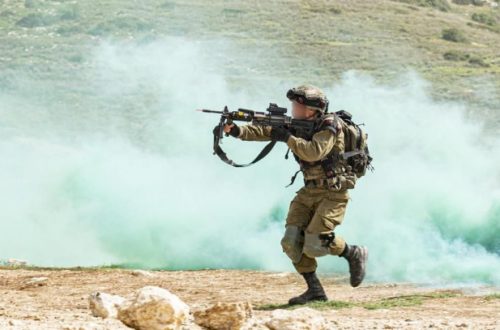This is a cross-post by Marc Goldberg
I knew that I had one minute to make it from the street to the apartment from which I could provide covering fire to my friends as they apprehended the terrorists. That was the plan, we would have one minute to get into position and then the rest of the unit would move. Speed was the key, the bad guys we were going after wouldn’t hang around, as soon as they heard the IDF was there they’d disappear like ghosts. We had one magic minute to get into place, after that, whether we were ready or not the other guys were going in. Speed and surprise were everything.
The armoured car stopped and my Sergeant, Ofir, said the magic word “PRIKA”, I kicked the back doors of the Knight armoured vehicle open and the eight of us ran out.
To keep count of the time I used a technique taught to me during training, I imagined a metronome ticking down the seconds, every time the metronome in my head moved from one side to another I shifted my rifle to cover a slightly different angle while counting down another second.
We reached the door of the apartment building and proceeded up the stairs,
43 seconds left.
I was third in line and taking pains to keep the barrel of my rifle in a relevant direction as we climbed the stairs.
38 seconds left.
The lights in the building were dim as we clattered our way up ever higher. The metronome kept ticking, I kept adjusting my rifle while on the move,
31 seconds left
We’re at the apartment door.
The first in line is covering the stairs that continue up, the last is pointing his rifle down in the direction from which we have just come and I’m banging on the apartment door. OPEN, OPEN, OPEN, OPEN, OPEN THE FUCKING DOOR!”
30 seconds.
The door isn’t opening and I’ve taken to kicking the steel and pounding on it with my fists, it’s past 2 am. and whoever’s inside needs to open the door now or Haim and Yuval and Oren and all my best friends are going to be running into a potential trap. The metronome is ticking down, I’m shouting more and more frantically at the closed door.
20 seconds remain,
I’m out of ideas for what to do next. I stop kicking at the door when I hear a bolt sliding on the other side, a man opens the door a fraction, I can hear him saying something about “yeladim, yeladim,” he’s babbling about his kids but I’m not interested in children I’m interested in a window and I know exactly where in that man’s apartment it is.
15 seconds.
I shoulder barge into the door and he can’t keep us out any longer, we all pile in, I charge forward towards a closed door that is in fact the gateway to my window. I can hear Ofir behind me reasoning with the Palestinian man who is vainly pleading “shhhh yeladim sheli”.
12 seconds left and I’m going to make it.
I kick the door open and step in. It’s a bedroom and there’s a woman lying in there propped up on one arm with a confused look on her face. “Get up! Get out” I say but she just keeps staring at me with this look that says, “Is this really happening” on it. Her sleep disturbed, she looks at me standing there in her doorway. I was going to say something else but the words stick in my throat. She doesn’t look afraid or even angry, just utterly confused as if I’m the dinner guest she forgot she invited.
My eyes flicker away from the figure in the white nightgown to the window, my window. The metronome keeps ticking while I stand there, it ticks down to 0 but I can’t move nor can I speak, I have lost my voice.
Standing there, sweat trickling into my eyes I knew the truth, I was a terrible soldier, I should have pulled her out of her bed, smashed the glass of the window and stood there with my rifle trained on the outside covering my friends while they went to take out the terrorists from the building opposite. Instead I have betrayed them, left them to go into harm’s way without my help. I felt Ofir’s hand on my shoulder. “Give her a couple of minutes to get herself together”. I step back out of the room thankful that Ofir gave me permission to stand down, as if he took my worries for my friends away from me and onto himself.
A couple of minutes later the woman steps out of the room all clad in black and wearing her headscarf, I escort her together with her 2 toddlers towards the front door. Her husband’s already been sent upstairs to let his neighbours know that they’ll be staying with them for the night when two members of the squad standing at another window shatter the relative calm of the situation when they open fire without warning.
The noise is deafening, the woman screams in panic, her 2 kids start crying, I don’t know what has caused the guys to start shooting. I motion the civilians down into the corner that offers the most protection while waiting for the shooting to stop. Once it’s safe they leave the front door for another apartment upstairs and I don’t see them again for the rest of the operation.
This was a slice of an operation that happened in Nablus 10 years ago during the Al Aqsa Intifada. The words written by Avner Gvaryahu in the Daily Beast reminded me of it vividly. Almost every operation that I carried out involved some form of interaction with civilians and many of them bore a strong resemblance to those described by Breaking the Silence in their literature and in their testimony.
His article really got me thinking and it got me remembering. When I went into the army I felt I was ready for anything, especially for a war. The almost daily atrocities against Israel had me more convinced than ever that service in the IDF was the most important thing I would ever do. By the end of my training I was ready for anything except perhaps for the reality of day to day life as a soldier not fighting a war but countering an insurgency, enforcing an occupation. I moved from having the superficial but broader overall picture of the conflict of a well informed civilian to being immersed in the day to day filth of it; the soldier’s eye view.
I didn’t like what I saw and I saw a lot, I saw a lot of things in myelf that I didn’t like and after my release I was gone, back to London to try and find some sort of perspective. After a while I came to the conclusion that a big part of the problem was my own idealistic view of what the IDF was when I joined. I hadn’t really reflected on the fact that ultimately the words ‘moral’ and ‘army’ are a contradiction when placed next to each other.
We train our boys and girls to kill, we aren’t so good at training them in occupying. We’ll throw the cream of our youth into morally ambiguous situations time and again and expect them to be able to figure it all out on their own. If there is any criticism to be aimed at Livni for using the word moral with regards to our soldiers it should be with a view to the fact that there is nothing moral about the business of fighting.
Ultimately serving in the West Bank presented me with a whole load of situations that were nothing other than grey. Often in the wake of a mission I wondered if the future terrorists we created were worth catching the terrorist we had picked up. Sometimes I wondered if the terrorist was a terrorist at all or a source for the Shin Bet, other times I looked a suicide bomber in the face and saw an entire bus full of people who were still alive because he (and sometimes she) had been arrested. There is no simple solution to the problems we face here and to argue otherwise is to ignore the reality of life here.
So when Avner leaves us with the words;
“The bottom line is that if the youth of tomorrow want justice for both Israelis and Palestinians, there is no way to avoid taking responsibility for what we have all, in part, helped create. We must look in the mirror and not be afraid to confront the unconscionable reality that is Israel’s military occupation.”
I say he is right, but by the same token ignoring the current necessity of this military occupation is to walk along a path that will lead to even greater misery and hardship for all of us. There is neither the black of a full withdrawal or the White of staying, simply the grey future where both Israelis and Palestinians will slowly move towards living together in the bigger picture.


